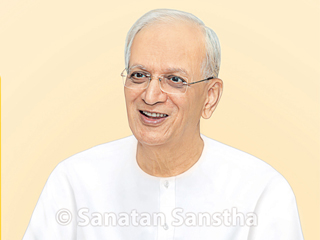
It has become necessary to once again nurture the ‘Guru-disciple’ tradition, and Gurupournima is the right occasion to remember and follow this tradition. It has become imperative for Hindus to unite under the blessings of Gurus (Saints) to combat constant attacks on the Nation & Dharma. Sanatan has organised Gurupournima celebrations and gatherings of Hindus with this purpose.
The real mission of the Guru is to turn the materialistic society towards sadhana (Spiritual practice) and help a true disciple attain Moksha (Final Liberation). True disciples tread this path alone and perform samashti (Spiritual practice for the spread of Spirituality) mission throughout their life. Sacrificing mind-body-wealth in the samashti mission of the Guru is the expression of the disciple’s real gratitude unto Him.
The Guru-disciple tradition has contributed to society in no small measure. This glorious tradition has evolved Hindu society morally, culturally and spiritually. History testifies that whenever Dharma has faced lassitude, the Guru-disciple tradition has actively participated in the process of reinstating Dharma.
Today, since society is practising unrighteous ways of life, the spiritual strength of the Nation has reduced. In the name of Dharma, unrighteous behaviour is practised rampantly. In short, the soul of Sanatan Dharma is missing, and its lifeless body has remained. Hence, it has become inevitable that Dharma be reinstated.
Today, reinstating Dharma means the creation of an ideal, alternative system of governance based on Dharma. Brahmatej (Radiance of a Brahman) and Kshatratej (Radiance of a Kshatriya) are the two aspects necessary for reinstating Dharma. Through sadhana, most Saints and spiritual organisations (such as Sanatan Sanstha) are nurturing spiritual strength, i.e., Brahmatej; to change the pathetic state of the Nation, nationalist and devout organisations, Periodicals and intellectuals are actively working at the physical, psychological and intellectual levels respectively. They are all nurturing Kshatratej. The nature of this mission is given ahead.
1. Physical : Actual action for reinstating Dharma; for example, preventing harm to Dharma, organising rallies against harm to Dharma, taking direct action (protesting lawfully), etc. As per the present times, this aspect has 10% importance.
2. Psychological : As per a principle, ‘Unless national and religious sentiments are awakened, action does not take place’. Hindus, in general, should be educated on the concept of reinstating Dharma and be inspired to become proactive for this noble cause; for example, giving educative articles in newspapers, Periodicals, etc., giving speeches, etc. This too has 10% importance.
3. Intellectual : Giving direction to Hindu society on reinstating Dharma; for example, presenting a scholarly analysis of threats to the Hindus, providing intellectual strength to organisations. As per the present times, this aspect too has 10% importance.
4. Spiritual : Performing spiritual practice so as to provide spiritual strength to the physical, psychological and intellectual mission for reinstating Dharma; for example, chanting or performing Yajnas (Sacrificial fires) for the fulfilment of a task. As per the present times, this aspect has immense importance – 70%.
In addition to the Guru-disciple tradition and spiritual sects, every Hindu should perform the task of Kshatratej (at the physical, psychological and intellectual levels) and Brahmatej (at the spiritual level) as per his ability to reinstate Dharma and nurture the Guru-disciple tradition.
O’ Hindus ! From this year’s Gurupournima, be proactive towards the reinstating Dharma and be an integral, radiant part of the historic event of establishing the ‘Hindu Nation’.
– Paratpar Guru (Dr.) Athavale
Every Hindu should perform the task of Kshatratej and Brahmatej as per his ability so as to reinstate Dharma !
Today, reinstating Dharma means the creation of an ideal, alternative system of governance based on Dharma !
| Individual spiritual experiences of seekers published here are according to the Principle – ‘Where there is bhav (Spiritual emotion), there is God’. It is not that every individual will have similar experiences. |

 The country’s first ‘Hindu village’ will be established in Chhatarpur (Madhya Pradesh)
The country’s first ‘Hindu village’ will be established in Chhatarpur (Madhya Pradesh) A Journey to the Abode Absolute
A Journey to the Abode Absolute Tell the world firmly that India is ‘Hindavi Swarajya’ : Durgesh Parulkar, renowned writer and orator
Tell the world firmly that India is ‘Hindavi Swarajya’ : Durgesh Parulkar, renowned writer and orator On the 83rd Birth Anniversary of Sachchidananda Parabrahman (Dr) Athavale (Founder of Sanatan Sanstha) ‘Sanatan Rashtra Shankhnad Mahotsav’ to be held in Goa
On the 83rd Birth Anniversary of Sachchidananda Parabrahman (Dr) Athavale (Founder of Sanatan Sanstha) ‘Sanatan Rashtra Shankhnad Mahotsav’ to be held in Goa Nepal’s former King Gyanendra’s security reduced
Nepal’s former King Gyanendra’s security reduced Violent protest demanding Hindu Rashtra in Kathmandu (Nepal)
Violent protest demanding Hindu Rashtra in Kathmandu (Nepal)